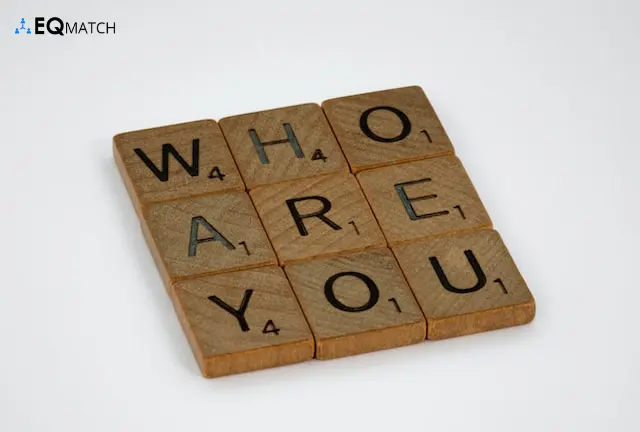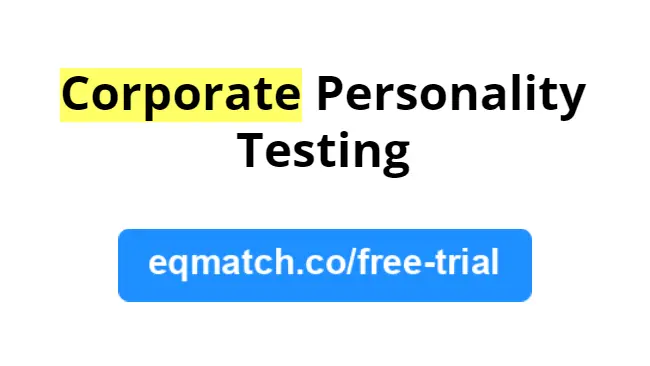The importance of creating a cohesive, high-performing team cannot be undermined.
HR leaders spend a great deal of time and effort creating an environment to improve workforce productivity.
Therefore, it becomes important to take the right steps to ensure that you are hiring the right people for the job.
Welcome to the world of corporate personality testing.
In this post, we will explore what personality testing is, how it can benefit your company, and what you need to consider before implementing it in your hiring process.
What is Corporate Personality Testing?
Corporate Personality Testing involves the use of psychological assessments to evaluate a candidate’s personality traits and characteristics in the workplace.
Recruiters and hiring managers use these assessments to better understand how well a candidate’s personality would fit into the organization’s culture and values.
Workplace personality tests aim to measure a candidate’s behavioral tendencies, emotional intelligence, and cognitive abilities.
The History of Personality Testing
Personality testing dates back to the early 20th century when the first psychological assessment was developed by the U.S. military.
The goal was to identify soldiers who were suitable for certain positions based on their personality traits.
Since then, personality testing has been used for various purposes, including hiring and training employees.

Types of Corporate Personality Tests
There are several types of workplace personality tests. These include the Myers-Briggs Type Indicator (MBTI), the DISC assessment, the Big Five personality traits, and the Hogan Personality Inventory (HPI).
Each of these tests measures different aspects of a candidate’s personality.
The Role of Personality Testing in the Hiring Process
Personality testing plays an important role in the hiring process. It provides a more holistic view of a candidate’s personality, beyond what is observable in a traditional interview or resume.
It helps recruiting professionals to assess a candidate’s fit with the company culture and values, as well as identify potential areas of strengths and weaknesses.
The insights gained from workplace personality tests can also inform the onboarding and training process, leading to better employee retention and performance.
How to Use Personality Tests?
Personality tests are typically administered online, either before or after the interview process. Candidates are provided with a link to the test, which they can complete on their own time.
The tests usually take between 30 and 60 minutes to complete and are scored by a licensed psychologist or trained HR professional.
Difference Between Personality Test and Skills Test
Personality tests and skills tests are two distinct types of assessments used in the hiring process.
While personality tests evaluate a candidate’s behavioral tendencies and emotional intelligence, skills tests measure a candidate’s technical abilities and knowledge related to the job position.
Both types of assessments are valuable in evaluating a candidate’s suitability for a position.
How Long Does it Take to Administer a Personality Test?
The length of time it takes to administer a personality test depends on the specific test being used.
Most tests take between 30 and 60 minutes to complete, although some may take longer. It is important to communicate the estimated time commitment to candidates in advance to ensure they have enough time to complete the assessment.
Is it Legal to Use Personality Tests in the Hiring Process?
While personality testing is a valuable tool in the hiring process, it is important to ensure that the tests used are legally compliant.
Employers must ensure that the tests used do not discriminate against candidates based on protected characteristics such as race, gender, or disability.
Corporate Personality Testing is a valuable tool for assessing a candidate’s suitability for a position based on their personality traits and characteristics.
Recruiters and hiring managers can use personality testing to gain a more holistic view of a candidate’s personality and ensure a good fit with company culture and values. It is important to ensure that personality tests used are legally compliant and do not discriminate against candidates based on protected characteristics.

The Benefits of Corporate Personality Testing
Personality testing is a valuable tool that can help companies make more informed hiring decisions, improve employee engagement and retention, reduce turnover and training costs, and enhance team dynamics and communication.
Let us explore some of the ways that personality testing can benefit your organization.
Increased Accuracy in Hiring Decisions
Unlike traditional interviews and resumes, personality testing can provide insights into a candidate’s personality traits and characteristics.
This helps HR in making more accurate hiring decisions by selecting better-fit candidates for the position.
Personality tests help hiring managers gain a deeper understanding of a candidate’s personality.
This, in turn, helps them more accurately predict how well they will fit into the company culture and values, as well as how they will perform on the job.
Improved Employee Engagement and Retention
Personality testing can also help improve employee engagement and retention.
How? These tests help HR hire candidates who are a good fit for the company’s culture and values. Such people are more likely to be engaged and satisfied with their work.
This can lead to increased productivity, better job performance, and reduced turnover. By investing in personality testing, companies can reduce the cost of turnover and training, while also improving overall employee satisfaction.
Reduced Turnover and Training Costs
As mentioned earlier, the two big benefits of personality testing are the reduction in turnover and training costs.
By hiring candidates who are a good fit for the company’s culture and values, employees are more likely to stay with the company long-term.
This reduces the cost of turnover, which can be significant, especially for high-level positions. Additionally, by hiring candidates who are a good fit, training costs can be reduced as well, as these employees are more likely to pick up new skills and knowledge quickly.
Better Team Dynamics and Communication
Personality tests for team building can also help improve team dynamics and communication. By understanding each team member’s personality traits and characteristics, managers can create more cohesive teams that work well together.
This can lead to better communication, increased productivity, and improved overall job performance.
Legal Considerations When Using Personality Testing
While personality testing can provide many benefits, it is important to consider legal considerations when using these tests in the hiring process.
In the United States, personality tests are regulated by the Equal Employment Opportunity Commission (EEOC) under the Americans with Disabilities Act (ADA) and the Civil Rights Act (CRA). Employers must ensure that the tests used do not discriminate against candidates based on protected characteristics such as race, gender, or disability.
Corporate Personality Testing: Cost to Implement?
How much does it cost to implement Personality Testing in the hiring process?
The cost of implementing personality testing in the hiring process can vary depending on the specific test being used and the size of the company. Some tests may be more expensive than others, and companies may need to invest in training and certification for HR professionals to administer the tests.
However, the benefits of personality testing can far outweigh the cost, especially when considering the reduction in turnover and training costs.
Can Personality Testing Help with Diversity and Inclusion Efforts?
Yes, personality testing can also help with DEI efforts.
Using these tests, recruiters and hiring managers can better assess the personality traits and characteristics of candidates.
This further helps them identify candidates who may bring different perspectives and experiences to the team.
The result is a more diverse and inclusive workplace.
And as you already know, this has been shown to improve overall job performance and productivity.
What Happens if an Applicant Fails a Personality Test?
Just because an applicant fails a personality test, it does not necessarily mean that they are not a good fit for the position. Personality tests are just one tool in the hiring process and should not be the sole determinant of a candidate’s suitability for the position.
If a candidate fails a personality test, Hr should review the results with the candidate and provide feedback on areas for improvement.
Personality testing can provide many benefits for companies looking to improve their hiring process, employee engagement and retention, team dynamics, and diversity and inclusion efforts. However, it is important to use personality testing responsibly and legally, and to remember that these tests are just one tool in the hiring process.
By combining personality testing with other methods such as traditional interviews and skills assessments, companies can make more informed hiring decisions and build a strong and productive workforce.

Implementing Corporate Personality Testing
Choosing the right test for your company’s needs
Not all personality tests are created alike.
Different types of personality test available measure different aspects of personality.
It is important to choose a test that is validated and reliable, and that measures traits that are relevant to the specific job or position being hired for.
Understanding the limitations of personality testing
While these tests can provide valuable insights into an individual’s personality, they are not foolproof and should not be used as the sole criteria for making hiring decisions.
Other factors such as work experience, skills, and qualifications should also be taken into consideration.
Ensuring test validity and reliability
This is crucial to the accuracy of the test results.
The concept of validity suggests that a test is valid if it measures what it claims to measure. And reliability refers to the consistency and stability of the results over time. Businesses should choose tests that have been validated and standardized. And that the tests should have proven reliability through repeated testing.
Maintaining confidentiality and protecting employee data
Organizations using personality testing in the workplace should have clear policies in place.
These policies should detail:
- how the test results will be used
- who will have access to the results
- how the results will be stored and protected
Preparing employees for the testing process
This can help to alleviate any concerns or anxieties they may have about the test.
HR should inform employees about the purpose of the test, what traits it measures, and how the results will be used in the hiring process.
Employees should also be allowed to ask questions and address any concerns they may have.
Addressing employee concerns and questions
Employees should feel comfortable asking questions and raising concerns about the test, and their feedback should be taken into consideration. Organizations should also be transparent about the testing process and how the results will be used.
Can employees refuse to take a personality test?
While it is generally not advisable for employees to refuse to take a personality test, there may be certain circumstances where this is allowed.
Consider an employee who has a disability. Or that it could be difficult or impossible for them to take the test. In such a situation, the business may need to make accommodations or use alternative methods to assess their suitability for the job.
How can companies prevent cheating or faking in personality tests?
No test is foolproof. Organizations should carefully evaluate personality tests to minimize the potential for cheating or faking. They should have procedures in place to detect and address any instances of cheating or faking.
Are there any ethical concerns with using personality testing in the workplace?
Some critics argue that personality tests can be biased, invasive, and discriminatory.
HR decision-makers should use validated and reliable tests. They should also ensure that the testing process is fair, transparent, and non-discriminatory.
The Future of Corporate Personality Testing
Emerging trends and technologies in personality testing
One of the most significant developments in recent years has been the impact of AI and machine learning on personality testing.
These technologies have made it possible to analyze large amounts of data and provide more accurate and nuanced assessments of an individual’s personality traits. The impact of AI and machine learning on personality testing
AI and machine learning can help improve the accuracy and reliability of personality testing.
However, they also come with potential challenges and opportunities. For example, there are concerns about the potential for bias in algorithms and the ethical implications of using AI in the hiring process.
Despite these challenges, personality testing will likely continue to play a significant role in the hiring process in the years to come.
As technology continues to evolve, companies will need to stay up-to-date with advancements in personality testing technology to remain competitive and make informed hiring decisions.
How can HR leaders stay up-to-date with advancements in personality testing technology?
As companies look to incorporate emerging technologies in their personality testing practices, it is important to consider the potential risks and benefits.
For example, while AI and machine learning may improve the accuracy of assessments, it is also important to ensure that these technologies are used ethically and do not perpetuate bias or discrimination.
To stay up-to-date with advancements in personality testing technology, companies can partner with testing providers who are dedicated to research and development in this field.
Additionally, HR professionals and hiring managers can attend industry conferences and workshops to learn about the latest trends and technologies.
Will personality testing ever completely replace traditional interviewing methods?
In our opinion, it is unlikely that personality testing will completely replace traditional interviewing methods.
Personality testing provides valuable insights into an individual’s personality traits. However, other factors such as work experience, skills, and qualifications are also important areas of consideration during the hiring process.
Additionally, interviews allow for a more personal and human connection between the employer and the potential employee. Organizations should strive to maintain a holistic approach to hiring, considering a variety of factors to make informed decisions.
As personality testing continues to evolve, companies must also be mindful of ethical considerations and take steps to ensure the validity and reliability of their testing practices.
Conclusion: Corporate personality testing
Corporate personality testing can provide valuable insights into an individual’s personality traits, which can be used to make more informed hiring decisions and improve employee engagement and retention.
Some of the key benefits of personality testing include increased accuracy in hiring decisions, improved employee engagement and retention, reduced turnover and training costs, and better team dynamics and communication.
However, it is important to remember that personality testing is just one piece of the hiring process and should be used in conjunction with other factors such as work experience, skills, and qualifications.
HR decision-makers should consider the specific needs and goals of their company when choosing a personality test, and ensure that the test is valid and reliable. Personality testing is likely to continue to evolve as new technologies and trends emerge.
Corporate personality testing can be a valuable tool for HR decision-makers to make more informed hiring decisions and improve employee engagement and retention.
FAQs
Here are the frequently asked questions related to corporate personality testing
Which are the most popular personality tests for employers?
Myers-Briggs Type Indicator (MBTI), DISC assessment, and the Big Five Personality Traits test are generally cinsidered the most popular ones.
What personality test do corporations use?
Organizations use a variety of personality tests depending on their needs.
As stated earlier, some of the most widely used ones include the MBTI, DISC assessment, and the Hogan Personality Inventory.
What’s the most widely used corporate personality test?
The most widely used corporate personality test is the Myers-Briggs Type Indicator (MBTI).
What is the best personality test for the workplace?
The best personality test for the workplace depends on the company’s specific needs and goals. Some tests are more focused on team dynamics and communication, while others may be better suited for leadership development or talent acquisition.
What are the 4 types of personality test?
The four main types of personality tests are the Myers-Briggs Type Indicator (MBTI), DISC assessment, the Big Five Personality Traits test, and the Hogan Personality Inventory.



No responses yet